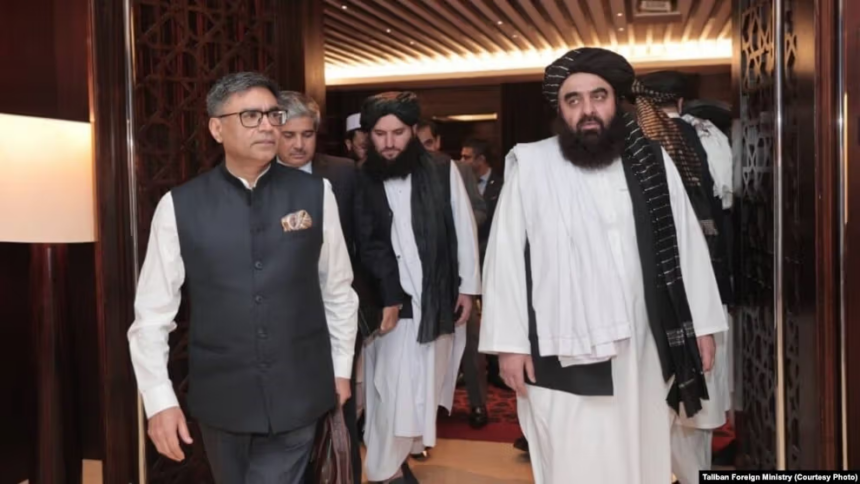RASC News Agency: In a strategic pivot that marks a potential recalibration of India’s foreign policy toward Afghanistan, The Economic Times has reported that New Delhi is gradually normalizing its relations with the Taliban a regime internationally condemned for its human rights abuses, suppression of women, and extremist ideology. This shift reportedly includes the resumption of visa services for Afghanistanis, renewed high-level diplomatic contacts, and the issuance of entry permits for over 150 Afghanistan-based freight trucks carrying goods into Indian territory. Published on Thursday, June 5, the report characterizes these developments as signs of a “measured and deliberate transformation” in India’s approach to the Taliban. The newspaper underscores that, amid intensifying regional rivalries particularly between India and Pakistan such a recalibration carries unmistakable messages not only for the Taliban but for the broader geopolitical landscape.
According to the report, the decision to permit cargo trucks transporting dry fruits from Afghanistan into India is widely seen as a tacit signal: India no longer seeks to prolong an adversarial posture with the Taliban, despite the group’s historical role as a strategic proxy of Pakistan’s military-intelligence complex. The Economic Times notes that India has long valued its cultural, economic, and civilizational ties with the Afghanistani people. However, the collapse of the republic government in Kabul in August 2021, followed by the Taliban’s violent seizure of power, had prompted New Delhi to suspend diplomatic operations and halt all visa services. Analysts now interpret recent developments as indicators of a broader strategic realignment one that attempts to engage with political realities on the ground without offering de jure recognition to a regime mired in international controversy.
Despite the tactical rationale, India’s re-engagement with the Taliban is fraught with moral and geopolitical risks. The Taliban remain a regime that has systematically dismantled women’s rights, crushed the free press, persecuted ethnic minorities, and empowered terrorist elements. The notion of “normalizing” relations with such a regime has raised profound concerns among human rights observers and former Afghanistani officials in exile. Even so, India appears to be driven by the logic of realpolitik. As China deepens its influence in post-republic Afghanistan through trade, infrastructure, and diplomatic overtures India faces pressure to maintain its own strategic foothold. New Delhi’s outreach to the Taliban, while cautious, may be aimed at counterbalancing Beijing’s growing presence and preventing the region from falling entirely under a Sino-Islamist axis.
The report further highlights the growing friction between the Taliban and Pakistan, a relationship that once functioned in lockstep. Continued cross-border skirmishes and Pakistan’s mass deportation of Afghanistani refugees have strained what was once viewed as a patron-client dynamic. While China has attempted to mediate between the two actors, Islamabad’s enduring view of Afghanistan as its “strategic backyard” continues to hinder genuine reconciliation. According to The Economic Times, Indian policymakers now recognize an unavoidable truth: regardless of whether the Taliban gain international recognition, they remain a de facto authority that will shape regional politics. In this context, Indian engagement even without formal recognition may allow New Delhi to exert limited influence on the ground and ensure that strategic decisions in Kabul are not made solely in Beijing or Islamabad.
The paper argues that Western powers should support India’s nuanced approach as a means to curb Chinese hegemony in the region. Yet, this view is not without controversy. Critics warn that any diplomatic legitimization of the Taliban however implicit risks normalizing their repressive regime and undermines the values of human dignity, democratic governance, and gender equality that the international community once vowed to uphold in Afghanistan. India’s engagement may be driven by necessity rather than preference. But the Taliban’s continued rule founded on coercion, religious fundamentalism, and systemic exclusion remains morally indefensible. Any normalization effort, no matter how tactful, must confront the paradox of negotiating with a regime that has shown little interest in reform, accountability, or basic human rights.






